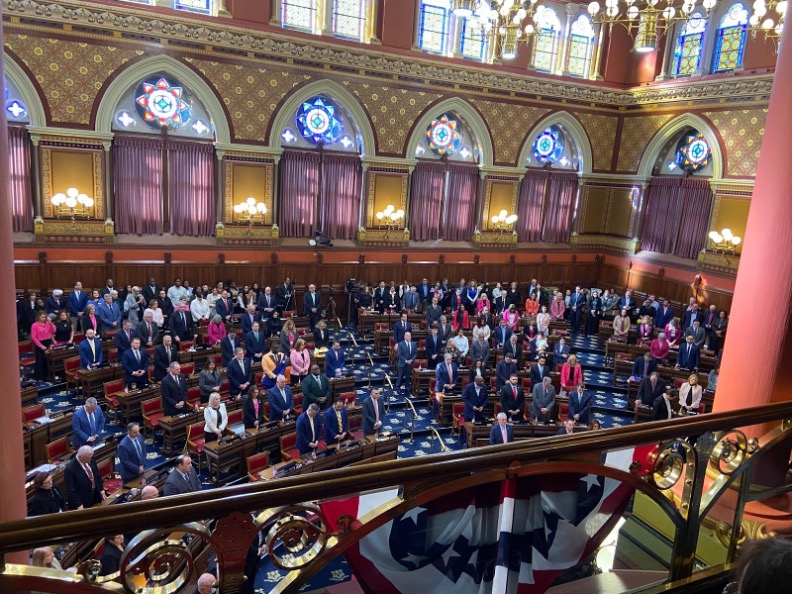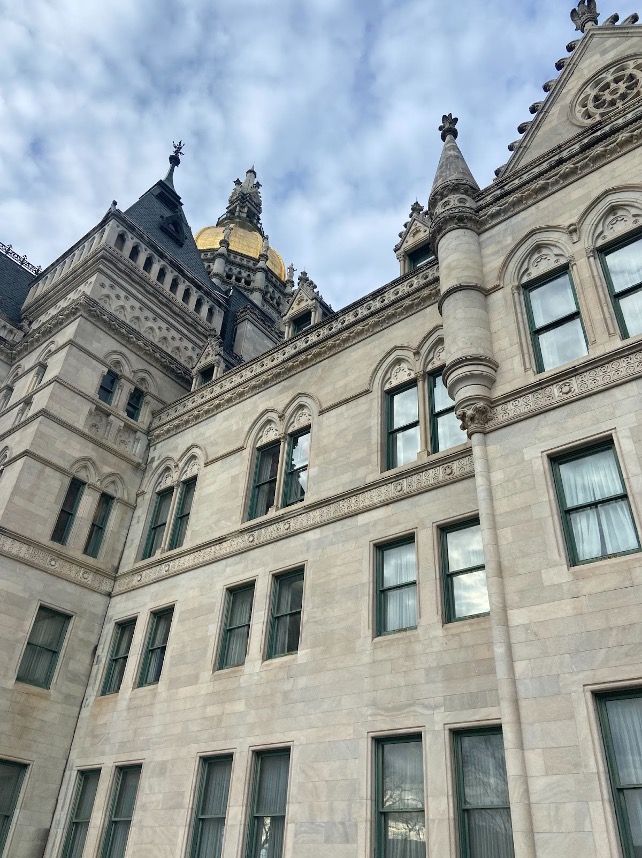As the dust settles from a productive 2024 legislative session, I’d like to provide an update on ConnCAN’s policy progress, partnership and impact on student opportunity across Connecticut. This is my first legislative session as ConnCAN’s Executive Director and I am proud of what we accomplished and how we went about it. While we must continue to make significant efforts to close opportunity gaps and improve learning outcomes for all students, we are confident that, through partnership in the community and at the Capitol, Connecticut will be stronger, and smarter as a result. So, here’s where we stand:
Policy Progress
Student-Centered Funding:

In 2023, through ConnCAN’s participation in the Education Justice Now coalition, the Connecticut General Assembly passed a historic $150M investment in our public school system. Every school, in all corners of the state, benefited from the legislation. We accessed public will and the bi-partisan, bi-cameral leadership necessary to act on a pressing, potential transformative issue for our students. As a result, we entered the 2024 session with our funds in the biennial budget, largely poised for 2025 given that federal covid funds sunset at that time. However, on the opening day of the 2024 session, we saw our investment stripped out of the Governor’s recommended budget adjustments. This activated our coalition to lean on our strong legislative support, pushing back against any recommendations to cut this investment in our learners. Through our steadfast advocacy, legislative leaders successfully protected the $150M and passed HB5523 to allocate funds equitably. Our coalition will continue advocating for permanent policy reform to ensure that funds are invested in all schools and school types throughout the state, but our resolve to preserve existing funding was essential given the resistance we experienced from the Executive branch.
Educator Diversity and Certification:

ConnCAN entered the 2024 session with a key priority, given the current educator shortage in our highest need communities: modernize our educator certification system with a focus on diversification. Our current certification system, conceived in the last century, is riddled with regulatory constraints and slow bureaucratic processes. This is untenable in today’s fast-paced economy. Through our coalition work with The New Teacher Track, and other stakeholder groups, we put together a comprehensive legislative package to reduce recertification costs and frequency, expand pathways for prospective educators and establish a standards board to keep our system responsive and dynamic to the changing needs of the sector. The result of HB5436 has enormous potential for our educators. Now, districts will have greater staffing flexibility, educators will save time, energy and resources on recertification, and prospective educators will have a clear path to the profession with less administrative obstacles. Given that expanding non-traditional pathways consistently increases educator diversity, we believe this new, more accessible system will have a disproportionately positive impact on educators of color.
Access to High-Quality Public Education Options:
 Every child deserves an educational environment that works for their specific needs and ConnCAN is committed to expanding access to school models with demonstrated success and impact. This year, ConnCAN stood alongside its charter school partners, namely the Connecticut Charter School Association (CTCSA), Latinos for Educational Advocacy and Diversity (LEAD), and Capital Prep – Middletown to advocate for community-supported charter schools across the state. The result, from a legislative perspective, was mixed, but with some notable progress.
Every child deserves an educational environment that works for their specific needs and ConnCAN is committed to expanding access to school models with demonstrated success and impact. This year, ConnCAN stood alongside its charter school partners, namely the Connecticut Charter School Association (CTCSA), Latinos for Educational Advocacy and Diversity (LEAD), and Capital Prep – Middletown to advocate for community-supported charter schools across the state. The result, from a legislative perspective, was mixed, but with some notable progress.
First, the final negotiated spending agreement expanded seats for our existing charter schools, allowing them to reduce the size of their waiting lists, and expand their model to new age-groups, namely pre-K. This win was significant and largely driven by the advocacy of CTCSA and their member schools. Additionally, through access to bonding, charter schools can receive funds for HVAC improvements, assisting with healthier schoolhouses through clear air initiatives.
Next, ConnCAN partnered with parent and community leaders behind LEAD and Capital Prep – Middletown to advocate for funding from the legislature to open their doors for students. Through testimony, public action rallies, and press conferences, we continued to elevate the issue and made clear that academic injustice anywhere is a threat to justice everywhere. In the end, the schools did not receive the adequate funds necessary to open, but we remain steadfastly committed to their success in the coming months and years.
Language Access for Families:
In 2023, ConnCAN helped pass the Multilingual Learner Bill of Rights, a landmark policy supporting family access to key language services at the district level. Luis Ortiz, ConnCAN’s State Grassroots Manager, led the charge, working with coalition partners to ensure statewide implementation of the bill. Through a stronger partnership with the State Department of Education, we have seen a well-structured rollout of interpretation and translation qualifications. And, while full implementation has yet to occur, vital correspondence between the state and school districts is well underway, ensuring that all districts understand the family’s right to linguistically accessible services. ConnCAN will continue to expand language access conversations beyond school districts to protect access to government services and opportunities at all levels for individuals speaking languages beyond English.

Deepening Partnerships
The largest success we experienced was not only what we accomplished, but how we accomplished our goals. ConnCAN built a greater network of advocacy through new partnerships, both at the community and policy levels. These partnerships strengthen the education justice and access sector and ensure that our work reverberates throughout the state in a multitude of ways.
At the policy level, we are deeply grateful for the leadership of our Education Committee Co-chairs, Senator Doug McCrory and Representative Jeff Currey. Our work, especially in funding and certification, would have been impossible without their commitment to equity, access and excellence. Representative Currey attended key educator certification meetings, a sign of how urgent the issue was for our educators. Senator McCrory participated as a panelist in our Educator Diversity Forum, speaking truth powerfully.
At the grassroots and advocacy levels, we partnered with more than 20 organizations, many for the first time. In these partnerships, we created three formal coalitions for our funding, certification, charter and multilingual learner work. Our parent fellows built a network of over 230 parents, leveraging 36 public actions to push for policy change for families. The coalitions have lasting power and are committed to ensuring full implementation of policy.
What’s Next
 We know that Connecticut remains deeply unequal, leaving many of our students without access to enriching experiences, social mobility, and gainful employment. This negatively affects our civil society, and creates unnecessary harm to the lives and livelihoods of our young people and their families. ConnCAN knows that family and community economic success and future progress hinges on the strength of relationships between people, their government and systems of support. By working across the sector, ConnCAN is committed to ensuring people understand and realize their own power and leadership and have easy access to government, build relationships and trust with the people they elect to represent them, and understand how systems are built, maintained, reformed and improved.
We know that Connecticut remains deeply unequal, leaving many of our students without access to enriching experiences, social mobility, and gainful employment. This negatively affects our civil society, and creates unnecessary harm to the lives and livelihoods of our young people and their families. ConnCAN knows that family and community economic success and future progress hinges on the strength of relationships between people, their government and systems of support. By working across the sector, ConnCAN is committed to ensuring people understand and realize their own power and leadership and have easy access to government, build relationships and trust with the people they elect to represent them, and understand how systems are built, maintained, reformed and improved.
The work left for each of our priorities remains ever urgent, and the partnerships we build to break cycles of inequity will strengthen through coordination, trust and mission-alignment.
We are here for students, families and educators, and we look forward to doing the work necessary to improve lives and to support better outcomes for our people and our society.
